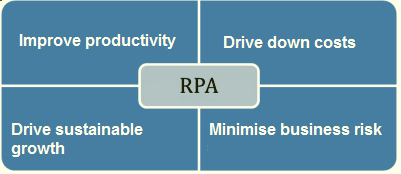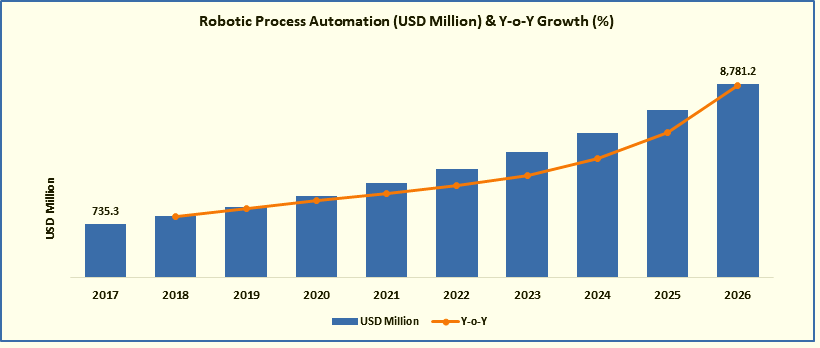RPA/IPA within BFIS: Banking, Financial And Insurance Services
The pandemic has surged the requirement and scaling of robotisation, amidst many organisations. Affiliations are experiencing, significant influences across practical environments as outstanding innovation begins to emerge. In this article, we proceed to see one such innovative advancement, Intelligent Process Automation (IPA), that has recently enabled organisations with robotising excess and rule-based strategies, whilst using bots to mirror customers. Therefore, an extraordinary development and advancement enabling yielded theory is accomplished, in a relatively short period of time. Regardless, this does not conclude; there are different avenues for IPA for BFIS and execution in various ventures yet to be accomplished.
RPA/IPA Technology
RPA, relates to development that may be used to robotise definitive work processes. RPA is uncommonly viable in digitising varying degrees of tasks (rules-based services) these processes ordinarily, are quite time consuming. RPA uses a specialised technique involving data control and mechanical intervention to automate rule based tasks without requiring dependable human participation.
RPA in finance services can save up to 75% on operational costs while retaining, not only quality, but the desired level of competency is realised. The most prevalent procedures that RPA advancement may help, associated with financial projects are financial assessment, orchestration, cash flow, and endorsement analysis.
The Role of RPA

Intelligent Process Automation (IPA)
Intelligent process automation is a hybrid of machine learning and robotic process automation that aids humans in their work and evolves over time, without the necessity to be monitored. IPA developments assist banks in extending adequacy and dynamic accuracy by interpreting both structured and unstructured data into important information. Various benefits include human-robot coordination, automation of both, what are considered as unpleasant and mundane, all whilst enabling quality assurance, throughout, the entire process and customer journey. Thus, attributing to robust governance and consistent risk strategy.
Organisations consider Intelligent Process Automation to be a vital part of cutting-edge working models, as indicated by a McKinsey investigation [1].
As indicated by Forbes research from 2019, 85% of banks have as of now carried out IPA to accelerate essential undertakings and business tasks [2].
Advantages of RPA/IPA
- Further developed Efficiency: RPA/IPA can restrict human error altogether. It furthermore prompts a 20% reduction in the number of help-desk enquiries, similarly as an addition in client dependability by shortening the response time.
- Cost-Effectiveness: At present, during what one would consider as turbulent times, globally, cost-cutting is essential for every industry, including banks. According to different assessments, RPA/IPA can diminish the amount of full-time indistinguishable, resources needed by 67%. Additionally, by engaging employees in high-priority work, businesses can reduce cost associated with resource and resource management, whilst still managing to increase productivity.
- Enhanced Customer Experience: IPA can be used by organisations to track the development of their process at every stage. This end-to-end audit trail will improve the client experience by optimising the outcomes.
- The Paradigm Shift: As development advances, the BFIS business is going through an adjustment period, with context to, banks searching for instantaneous and negligible cost elective arrangements, that facilitate definitive achievements and benefits. RPA/IPA is a vital part of this change since it further creates client reliability by means of digitalising the entire organisation and thinking about more noteworthy availability and versatility in operational processes.
According to McKinsey, automation will change economies and workforces, with ‘obvious genuine work’ addressing 81% of developments of each sort with automation potential [3].
How should the organisation adapt to emerging technologies such as RPA/IPA?
With headway in innovation and utilisation of RPA/IPA for business operations being carried out in a large portion, of the financial sector, the nature of work of humans is certainly improving. Now representatives are turning out to be liberated from tedious activities (unskilled/repetitive tasks are currently handled by RPA Technology) therefore, can use their time for more skilled tasks, whilst up-skilling and preparing, to align with latest tech and innovation.
Starting today, the robots are dealing with rules-based positions and capacities like finance and several tasks associated with, the handling of information.
According to Gartner, there are assumptions for 90% of huge associations embracing some type of RPA by 2022 [4].
RPA/IPA tools are being implemented within the BFIS sector as it has multiple benefits – such as reduction in operational costs, increased work efficiency, with unparalleled response times. With increasing use of RPA/IPA tools there will be a rise in the demand for skilled RPA/IPA professionals and new jobs will be created.
According to Polaris Market Research, due to the increasing demand for RPA, the market is estimated to reach USD 8.7 Billion by 2026 [5].
Future RPA Expansion

Reshaping BFIS with Intelligent Process Automation
Banking and financial businesses are, required to stay aligned to change in innovation and advancements. Organisations must recognise the complexity of customer requirements as they arise and swiftly oversee activities – IPA, provides the capability required, to undertake processes and avoid ineffective process deployment. IPA offers immediate client response automation.

IPA tools can be programmed and trained to interpret a wide scope of information and interact with a variety of systems. By eliminating the need for reiteration, while transitioning between systems, organisations, inevitably save time and money.

